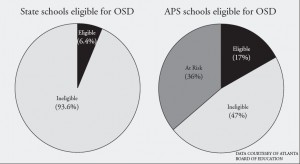APS creates new strategy to avoid Opportunity Schools eligibility

January 15, 2016
In 2015, the Georgia General Assembly passed Senate Bill 133, which has implications for school systems across Georgia and will go to voters in November 2016. The bill proposes the creation of the Opportunity School District, an amendment to the Georgia Constitution that would allow the state to take over failing schools for several years until they show improvement.
“That intervention can take a variety of different forms,” said David Jernigan, Deputy Superintendent of Atlanta Public Schools. “It can look like the state coming in and running the school. It can look like the state coming in and asking a charter operator to come in and take over the school. It could look like the state coming in and requiring the school district to make some staff changes.”
The reasoning behind the bill, Jernigan said, was to have the state play a more active role in the under performing schools.
A school has to receive a score below 60 on the College and Career Readiness Performance Index, or CCRPI, for three years to get a failing designation. A school’s CCRPI score is a combination of factors, including suspension rates, attendance, and graduation rates, as well as Milestone tests. At a Board of Education meeting on Oct. 5, APS Chief Schools Officer Donyall Dickey explained that 44 of APS’s 73 schools are at risk or eligible for state intervention.
To come up with an approach to set APS on a new trajectory, APS hired an outside consulting firm, the Boston Consulting Group, to assist in collecting and analyzing data.
“[BCG and APS] spent over two months studying our data to determine a paradigm for how we might go about providing the different levels of support for the types of schools that would need differentiated support systems based on what their issues were,” said Dr. Meria Carstarphen, Superintendent of APS.
That “non cookie cutter approach” system included three levels: foundational support, intensive support and targeted intervention.
“The foundational support tier is for all schools,” Jernigan said. “The intensive support is for schools that are at risk — right now that’s 26 schools, and then there are targeted intervention schools, which is that more intensive investment and the schools that we’re most concerned about.”
In an Atlanta Board of Education meeting on Nov. 2, Jernigan and Dickey outlined the district’s turnaround strategy for APS in a PowerPoint, saying what the strategy was, why it will be put in place and what it will hope to accomplish. It explains that the strategy is in place to address five main themes: academics, school leadership, teachers, students engaged and ready to learn, and the urgency of the situation.
The strategy is proposed as a funnel-shaped approach. The foundational support will focus on improving quality of education through teacher training. The targeted support, the next level down, will not only improve teachers and administrators, it will also focus on non-academic needs, such as nurses and students’ mental health, and reinforcing literacy and math. The intensive support will encompass both levels of support as well as providing additional learning opportunities through specialized tutors and designated learning time.
In their PowerPoint, Jernigan and Dickey also described that the approach is meant “to provide most extensive support to a small subset of schools.” There are around 12 schools in this subset, which mainly includes the elementary schools in the Carver and Douglass clusters.
“Our Achilles’ heel in performance is elementary level,” Carstarphen said. “Typically you have strong early childhood programs that give you a lift in the early grades of elementary. Our high schools have been doing a very tough job, but one that has been pretty successful at making right what they’ve been inheriting, as students have moved up through APS. So our strategy had to be different to address the elementary needs in a way that APS is gonna need to actually see a different turn around.”
For those elementary schools in the targeted intervention level, they will see tutors, specifically for literacy, as soon as next semester, and math and reading specialists starting next year. All schools will have improved instructional framework, and new employees may be placed in schools in the targeted and intensive-support levels for the 2016-17 school year.
“Our strategy will ensure that our students and our teachers have the support that they need to deliver access to high quality instruction,” Jernigan said, describing not just the hiring of tutors but also providing support to address non-academic needs. “This can range from providing better meal opportunities to employing psychologists to improve mental health for students.”
APS hopes that the state will consider their efforts before intervening if OSD is voted into law.
“The good news is that the state looks at the quantifiable data, but they also look at the subjective things,” Jernigan said. “Has the district been taking this seriously? Have they replaced school leaders who are not moving the needle? Have they done things that demonstrate that we are willing to take bold action on behalf of kids? And we are taking this very seriously.”
By Chase Kleber and Orly Mansbach





